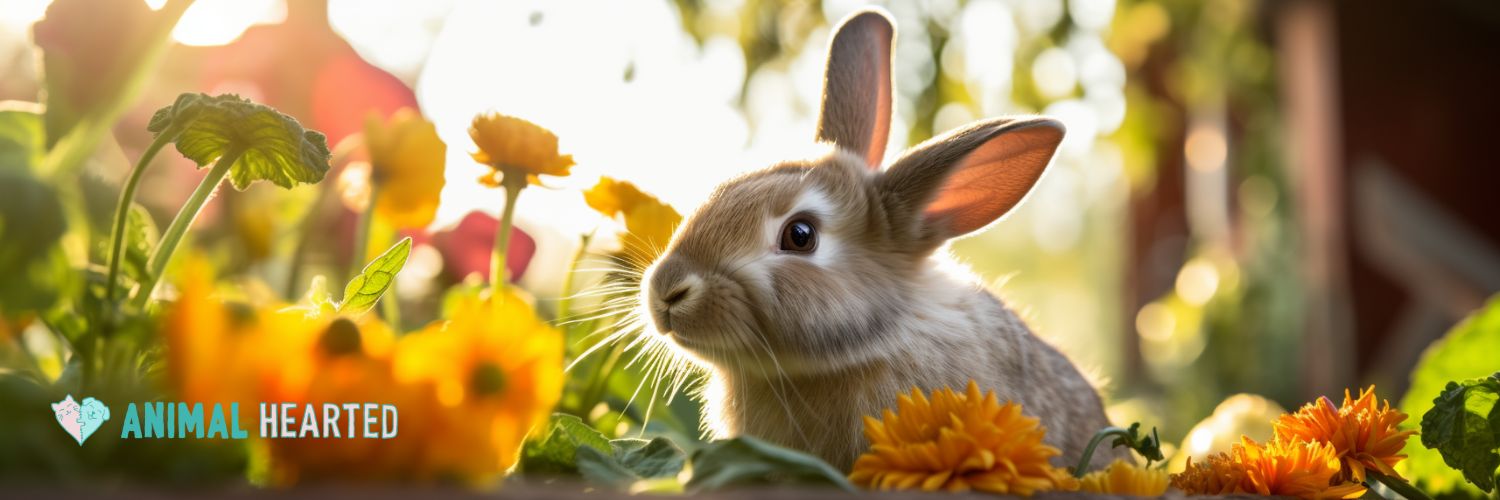shelter pets in need
Each order helps pets in need

You've spotted your furry friend eyeing the marigolds in your garden, and now you're wondering if it's safe to let them indulge. Well, you're not alone in this query!
Rabbit make great pets, and as a responsible pet owner, understanding what's beneficial or harmful for your rabbit is crucial. In this guide, we'll explore the nutritional profile of marigolds, potential risks, and how to safely include them in your rabbit's diet.
Let's dive into the world of rabbits and marigolds together!
Regarding your pet rabbit, it's essential to know that marigolds, while colorful and common in gardens, have specific properties that can affect your bunny's health. These flowers contain compounds that can be harmful if ingested in large quantities.
You'll want to ensure your rabbit avoids eating them. Marigolds aren't necessarily toxic to rabbits, but they're not a recommended part of their diet either.
When you're planning your garden or thinking about which flowers to keep around, it's wise to choose plants that are safe for your rabbit to nibble on. Opt for rabbit-friendly options like petunias or pansies instead.
Always monitor your rabbit when it's out and about, especially in areas where marigolds grow. It's better to be safe than sorry when it comes to your furry friend's health.

While few marigolds in your rabbit's diet won't cause significant harm, they offer minimal nutritional value to your pet's overall health. Marigolds are largely composed of water, and while they do contain some vitamins and minerals, these aren't in quantities substantial enough to benefit your rabbit significantly.
They've a modest amount of vitamin C and are a source of antioxidants, which can support general wellness, but these positives are overshadowed by the lack of essential nutrients that rabbits require, like fiber.
You're better off focusing on providing a balanced diet rich in hay, fresh vegetables, and a limited amount of pellets. These foods ensure your bunny gets the necessary nutrients for a healthy digestive system and overall well-being. Reserve marigolds as an occasional, decorative nibble rather than a staple in their diet.
Despite the minimal benefits, you should be aware of the potential risks before adding marigolds to your rabbit's diet. Marigolds contain lutein and xanthophylls, which, in excessive amounts, can lead to health complications.
Moreover, rabbits have sensitive digestive systems, and introducing a new food can cause gastrointestinal upset.
You must also consider that not all marigold species are safe; some can be toxic if ingested. Always ensure you're offering the right kind.
Additionally, marigolds may have been treated with pesticides or other chemicals, which can be harmful to your bunny. It's crucial to source organic or untreated flowers and introduce them slowly to monitor your rabbit's reaction.

You should introduce only a small number of marigolds to your rabbit's diet to ensure their safety and prevent digestive issues. Start with a few petals and observe how your bunny reacts over the next 24 hours.
You should also set up a rabbit feeder correctly, especially if you are using stackable rabbit cages. Doing so can minimize waste and also prevent contamination of their food.
If there's no sign of discomfort or adverse reactions, you can gradually include more, but marigolds should never become the mainstay of their diet.
Always wash the flowers thoroughly to remove any pesticides or chemicals. It's best to source marigolds from your garden or a place that's free from harmful substances.
If you're seeking variety for your rabbit's diet, consider safe flower alternatives like roses, hibiscus, or dandelion blooms. These flowers not only offer nutritional benefits but also introduce new textures and tastes that can enrich your bunny's eating experience.
Roses are a fragrant option, free from pesticides, and can be a delightful treat. Hibiscus, with its bright colors, is rich in vitamin C and can support your rabbit's immune system. Dandelion blooms are excellent as well, packed with minerals and a good source of fiber.
Remember to introduce any new food slowly to avoid upsetting your rabbit's digestive system. Always ensure the flowers haven't been treated with chemicals or pesticides that could harm your pet. Fresh, organic choices are best for your bunny's health and happiness.
You'll notice if your rabbit has an allergic reaction by symptoms like sneezing, itching, or swelling.
Always monitor closely after trying new foods and consult a vet if you're concerned.
Marigolds may deter pests around your rabbit. However, it's not a guaranteed solution. You'll want to look for other methods if you're noticing bugs still bothering your furry friend.
You're exploring natural remedies for your rabbit. While some claim marigolds have health benefits, they're not proven to treat rabbit ailments. It's best to consult a vet for reliable treatment options.
Marigold consumption might influence your rabbit's behavior, potentially reducing stress due to its calming properties.
However, it's essential to monitor for any unusual changes after they've eaten the flowers.
Wild rabbits naturally encounter marigolds, and they might nibble on them, but these plants aren't their preferred food.
You'll often see them opting for other greens in their environment instead.
You can safely offer marigolds to your rabbit as a treat, but do so in moderation. They're not only colorful but also provide nutritional benefits. However, make sure you're aware of the potential risks and always introduce new foods gradually.
Stick to safe feeding practices, and if you're looking for variety, plenty of other rabbit-friendly alternatives can add diversity to your pet's diet. Remember, your rabbit's health comes first, so always choose their snacks wisely.
Leave a comment